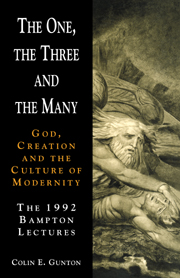Summary
The writing of all books involves a process of discovery. What happened in this case was that what began as a study of culture became both that and a study of the doctrine of creation. The reason is that the human activity we call culture takes shape in the context of what is sometimes called nature. The created world provides the framework within which human activity takes place. Because, however, a salient feature of the culture we call modernity is its confusion about the nature of that relation, a study of our world that would probe its roots will soon find itself running up against the broader question of the character of the world within which that activity takes place.
The writing of all books also involves a process of conversation. Even for those who prefer to write in cloistered calm away from all direct human contact, there is the wisdom of the sources to be consulted. This book has gained from an immensely wider process of conversation. First drafts were read to the weekly seminar of the King's College, London, Research Institute in Systematic Theology, and I have many of its members to thank for comments which have strengthened the argument. I am as always particularly grateful to Christoph Schwoebel, whose careful response to all my writing means so much to me.
- Type
- Chapter
- Information
- The One, the Three and the Many , pp. xiii - xivPublisher: Cambridge University PressPrint publication year: 1993



